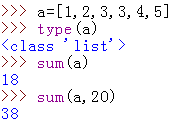4 回答
TA贡献1805条经验 获得超9个赞
sum(iterable[, start]) ,iterable为可迭代对象,如:
sum([ ], start) , #iterable为list列表。
sum(( ), start ) , #iterable为tuple元组。
最后的值=可迭代对应里面的数相加的值 + start的值
start默认为0,如果不写就是0,为0时可以不写,即sum()的参数最多为两个,其中第一个必须为iterable。
按照惯例,在开发语言中,sum函数是求和函数,求多个数据的和,而在python中,虽然也是求和函数,但稍微有些差别,sum()传入的参数得是可迭代对象(比如列表就是一个可迭代对象),返回这个被传入可迭代对象内参数的和。
比如:
TA贡献2019条经验 获得超9个赞
TA贡献1804条经验 获得超2个赞
sum(iterable[, start]) ,iterable为可迭代对象,如:
sum([ ], start) #iterable为list列表
sum(( ), start ) #iterable为tuple元组
......
最后的值 = 可迭代对象里面的数相加的值 + start的值
start默认为0,如果不写就是0,为0时可以不写
即sum()的参数最多为两个,其中第一个必须为iterable,例如:
>>> sum([1, 2, 3,], 4)
10
>>> sum((1, 2), 3)
6
如果你写成sum([1,2,3]),start就是默认值 0
>>> sum([1, 2, 3])
6
>>> sum([ ], 2)
2
>>> sum(( ), )
0
>>> sum([1, 2] , 0)
3
当然iterable为dictionary字典时也是可以的:
>>> sum({1: 'b', 7: 'a'})
8
>>> sum({1:'b', 7:'a'}, 9)
17
下面这些写法目前是不被接受的(以list为例,其他iterable同理):
一、
>>> sum([1,2],[3,4])
Traceback (most recent call last):
File "<pyshell#115>", line 1, in <module>
sum([1,2],[3,4])
TypeError: can only concatenate list (not "int") to list
二、
>>> sum(4,[1,2,3])
Traceback (most recent call last):
File "<pyshell#116>", line 1, in <module>
sum(4,[1,2,3])
TypeError: 'int' object is not iterable
三、
>>> sum()
Traceback (most recent call last):
File "<pyshell#117>", line 1, in <module>
sum()
TypeError: sum expected at least 1 arguments, got 0
四、
>>> sum(,2)
SyntaxError: invalid syntax
五、
>>> sum(1,3)
Traceback (most recent call last):
File "<pyshell#112>", line 1, in <module>
sum(1,3)
TypeError: 'int' object is not iterable
附其官方解释:
>>> help(sum)
Help on built-in function sum in module builtins:
sum(...)
sum(iterable[, start]) -> value
Return the sum of an iterable of numbers (NOT strings) plus the value
of parameter 'start' (which defaults to 0). When the iterable is
empty, return start.
TA贡献1836条经验 获得超3个赞
sum是python中一个很实用的函数,但是要注意它的使用,我第一次用的时候,就把它这样用了:
s = sum(1,2,3)
结果就悲剧啦
其实sum()的参数是一个list
例如:
sum([1,2,3])
sum(range(1,11))
还有一个比较有意思的用法
a = range(1,11)
b = range(1,10)
c = sum([item for item in a if item in b])
print c
输出:
45
| 1 |
- 4 回答
- 0 关注
- 914 浏览
添加回答
举报





